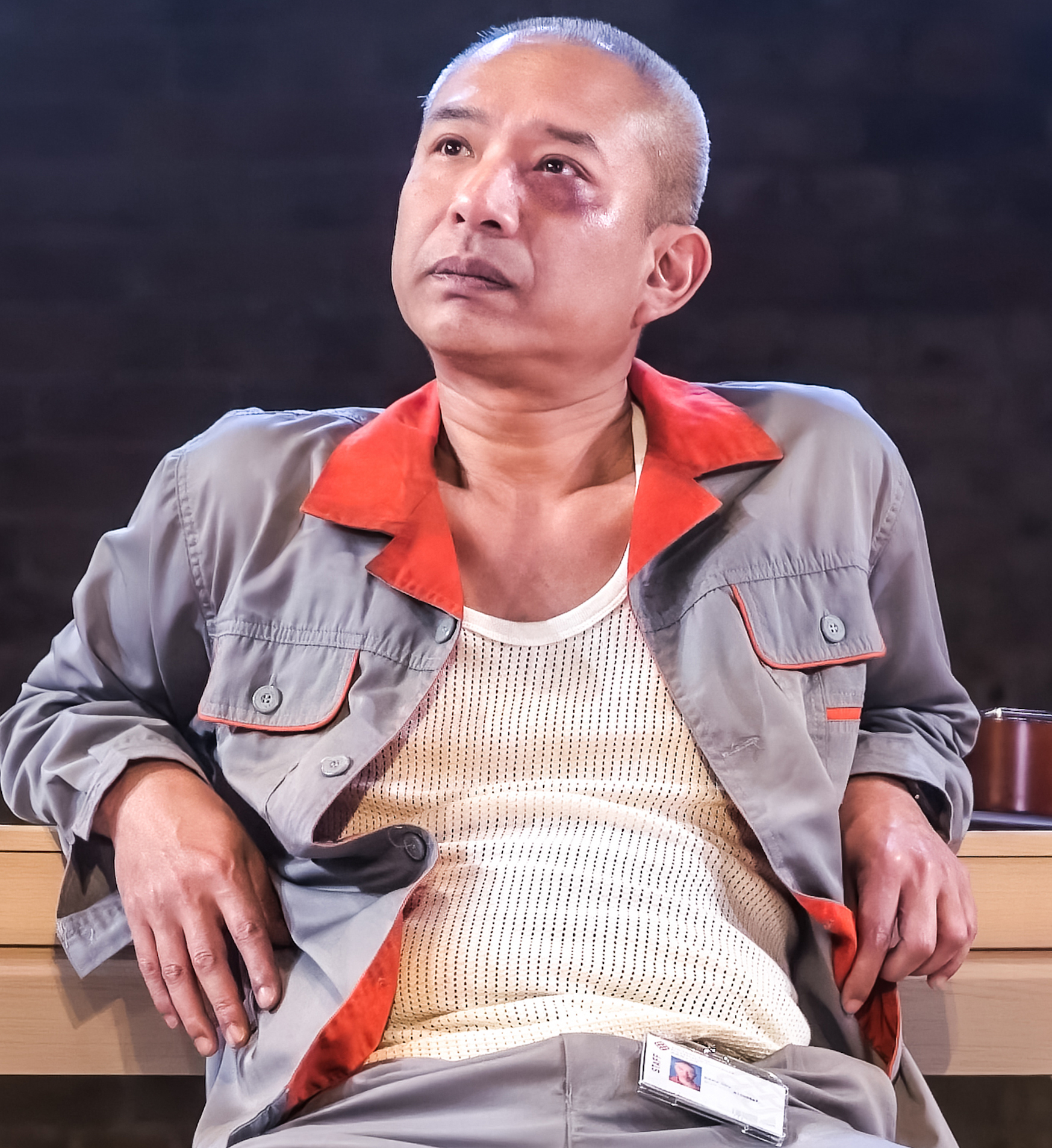A Playlist for the Revolution, Bush Theatre review - idealism meets reality head-on | reviews, news & interviews
A Playlist for the Revolution, Bush Theatre review - idealism meets reality head-on
A Playlist for the Revolution, Bush Theatre review - idealism meets reality head-on
Two students clash over changing the world with a playlist

The revolution in the title of AJ Yi’s new play at the Bush is the one activists hoped to set in motion in Hong Kong in 2019, when China’s stewardship was increasingly restricting their civil liberties.
It’s also a call to arms. At least, that’s what Chloe Chang (Mae Mae Macleod) is hoping when she suggests creating a playlist to the young economics student, Jonathan Lau (Liam Lau-Fernandez), whom she meets on the last night of her visit to Hong Kong. Chloe is, in Jonathan’s terms, “kooky”: a fashion-conscious law student who lives in the UK, loves to party and adores Beyoncé, K-Pop and BTS, but definitely not Coldplay. Even though yellow is her favourite colour.
The tentative relationship between Chloe and Jonathan, which begins at a club, is concocted from pretty predictable ingredients. He is an earnest besuited young man who conducts a risk analysis before every big decision: to her, he’s “so Asian”, a square who doesn’t know who Beyoncé is and can’t dance. She is his polar opposite: impulsive, idealistic, downright naive, but a great mover. You know there is a spark there when he throws caution to the wind and starts doing a bizarre routine that makes him look like a demented chicken.
Across the thousands of miles between Hong Kong and Durham, they start exchanging ideas for their playlist. She suggests Joni Mitchell’s "Big Yellow Taxi", but also John Lennon’s "Imagine" and, when the student pro-democracy protests kick off, Edwin Starr’s "War". Jonathan regards the demos as a nuisance, interruptions to his studies. But he is happy to allow Chloe to think he is taking part in them, carried along by a desire to impress.
They are a lively pair, but quite annoying and too jejune by half - even sensible Jonathan who lives in fear of disappointing his father and his father’s friends. The two actors deliver the lines at high velocity, and Macleod in particular is prone to swallowing her lines.
Luckily, they aren’t the only attraction. One day Jonathan arrives at the campus room he has booked so he can practise on its piano (music is a “craft” he thinks he has to master, typically), only to find an older man working on a poster who refuses to budge. Chu (Zak Shukor, pictured below) is a janitor, his poster a sign to take to the protests, which he has been inspired to join by the demonstrating students.
At once, the dynamic of the play changes. Chu is a cynical man, drily funny, wiry but weighed down by an unspoken emotion he is trying to bury. You sense his cynicism is born of this deep personal wound. He becomes the grown-up in Jonathan’s life, with advice worth listening to, especially about politics. Despite the social gap between them and Jonathan’s desire to stay “neutral” and not join the protesters, they become friends.
 The imbalance in their relationship shifts when Chu is reluctant to go to a gathering where the protesters will be singing a specially composed song that expresses their beliefs about a better future – and Chu admits he has given up on hope and doesn’t want to join them on this occasion. But Jonathan’s love of music and Chu’s politics converge, and Jonathan offers to go with him to the demo. The swap is neatly made: Chu has a replacement for the son he has lost and Jonathan has a father figure (his much-missed mother is dead, his father regularly away on business).
The imbalance in their relationship shifts when Chu is reluctant to go to a gathering where the protesters will be singing a specially composed song that expresses their beliefs about a better future – and Chu admits he has given up on hope and doesn’t want to join them on this occasion. But Jonathan’s love of music and Chu’s politics converge, and Jonathan offers to go with him to the demo. The swap is neatly made: Chu has a replacement for the son he has lost and Jonathan has a father figure (his much-missed mother is dead, his father regularly away on business).
Shukor is a mesmerising actor, still and focused, his every move quietly controlled, like an Aikido black belt’s. His face is often deadpan, which makes his sparky one-liners all the more effective, though his eyes are alive and locked onto their target. By the end, he has become a model of courage and selflessness.
This makes it hard for Jonathan and Chloe’s lives to look anything but Gen Z frivolous, even though both start showing signs of maturity, especially Jonathan, by the last scene. They are (dread word) relatable, but not especially appealing, though the awareness they reach is a promising new start.
The production, directed by Emily Ling Williams and sparely designed by Liam Bunster, ends on an uplifting note, an aerial shot of hundreds of demonstrating Hong Kongers, with their special song – at first played on a piano by Jonathan, then moved to a full orchestral arrangement – as a soundtrack. But the play feels like a partially missed opportunity.
After the performance was over, I realised that what was missing was a fully developed sense of the impact the dramatic events that had overtaken Hong Kong and displaced so many of its residents had had on those who left. We get one brief scene: I would have traded some of the scenes where Chloe and Jonathan chatter and banter about changing the world for a stronger sense of how they have been changed. Maybe Yi will write that play at some point soon.
rating
Explore topics
Share this article
The future of Arts Journalism
You can stop theartsdesk.com closing!
We urgently need financing to survive. Our fundraising drive has thus far raised £49,000 but we need to reach £100,000 or we will be forced to close. Please contribute here: https://gofund.me/c3f6033d
And if you can forward this information to anyone who might assist, we’d be grateful.

Subscribe to theartsdesk.com
Thank you for continuing to read our work on theartsdesk.com. For unlimited access to every article in its entirety, including our archive of more than 15,000 pieces, we're asking for £5 per month or £40 per year. We feel it's a very good deal, and hope you do too.
To take a subscription now simply click here.
And if you're looking for that extra gift for a friend or family member, why not treat them to a theartsdesk.com gift subscription?
more Theatre
 Edinburgh Fringe 2025 reviews: Ordinary Decent Criminal / Insiders
Two dramas on prison life offer contrasting perspectives but a similar sense of compassion
Edinburgh Fringe 2025 reviews: Ordinary Decent Criminal / Insiders
Two dramas on prison life offer contrasting perspectives but a similar sense of compassion
 Edinburgh Fringe 2025 reviews: Kinder / Shunga Alert / Clean Your Plate!
From drag to Japanese erotica via a French cookery show, three of the Fringe's more unusual offerings
Edinburgh Fringe 2025 reviews: Kinder / Shunga Alert / Clean Your Plate!
From drag to Japanese erotica via a French cookery show, three of the Fringe's more unusual offerings
 The Two Gentlemen of Verona, RSC, Stratford review - not quite the intended gateway drug to Shakespeare
Shakespeare trying out lots of ideas that were to bear fruit in the future
The Two Gentlemen of Verona, RSC, Stratford review - not quite the intended gateway drug to Shakespeare
Shakespeare trying out lots of ideas that were to bear fruit in the future
 Edinburgh Fringe 2025 reviews: The Horse of Jenin / Nowhere
Two powerful shows consider the Israeli-Palestinian conflict, with mixed results
Edinburgh Fringe 2025 reviews: The Horse of Jenin / Nowhere
Two powerful shows consider the Israeli-Palestinian conflict, with mixed results
 Edinburgh Fringe 2025 reviews: The Fit Prince / Undersigned
A joyful gay romance and an intimate one-to-one encounter in two strong Fringe shows
Edinburgh Fringe 2025 reviews: The Fit Prince / Undersigned
A joyful gay romance and an intimate one-to-one encounter in two strong Fringe shows
 Tom at the Farm, Edinburgh Fringe 2025 review - desire and disgust
A visually stunning stage re-adaptation of a recent gay classic plunges the audience into blood and earth
Tom at the Farm, Edinburgh Fringe 2025 review - desire and disgust
A visually stunning stage re-adaptation of a recent gay classic plunges the audience into blood and earth
 Works and Days, Edinburgh International Festival 2025 review - jaw-dropping theatrical ambition
Nothing less than the history of human civilisation is the theme of FC Bergman's visually stunning show
Works and Days, Edinburgh International Festival 2025 review - jaw-dropping theatrical ambition
Nothing less than the history of human civilisation is the theme of FC Bergman's visually stunning show
 Every Brilliant Thing, @sohoplace review - return of the comedy about suicide that lifts the spirits
Lenny Henry is the ideal ringmaster for this exercise in audience participation
Every Brilliant Thing, @sohoplace review - return of the comedy about suicide that lifts the spirits
Lenny Henry is the ideal ringmaster for this exercise in audience participation
 Edinburgh Fringe 2025 reviews: The Beautiful Future is Coming / She's Behind You
A deft, epoch-straddling climate six-hander and a celebration (and take-down) of the pantomime dame at the Traverse Theatre
Edinburgh Fringe 2025 reviews: The Beautiful Future is Coming / She's Behind You
A deft, epoch-straddling climate six-hander and a celebration (and take-down) of the pantomime dame at the Traverse Theatre
 Good Night, Oscar, Barbican review - sad story of a Hollywood great's meltdown, with a dazzling turn by Sean Hayes
Oscar Levant is an ideal subject to refresh the debate about media freedom
Good Night, Oscar, Barbican review - sad story of a Hollywood great's meltdown, with a dazzling turn by Sean Hayes
Oscar Levant is an ideal subject to refresh the debate about media freedom
 Edinburgh Fringe 2025 reviews - Monstering the Rocketman by Henry Naylor / Alex Berr
Tabloid excess in the 1980s; gallows humour in reflections on life and death
Edinburgh Fringe 2025 reviews - Monstering the Rocketman by Henry Naylor / Alex Berr
Tabloid excess in the 1980s; gallows humour in reflections on life and death
 Edinburgh Fringe 2025 reviews: Lost Lear / Consumed
Twists in the tail bring revelations in two fine shows at the Traverse Theatre
Edinburgh Fringe 2025 reviews: Lost Lear / Consumed
Twists in the tail bring revelations in two fine shows at the Traverse Theatre

Add comment